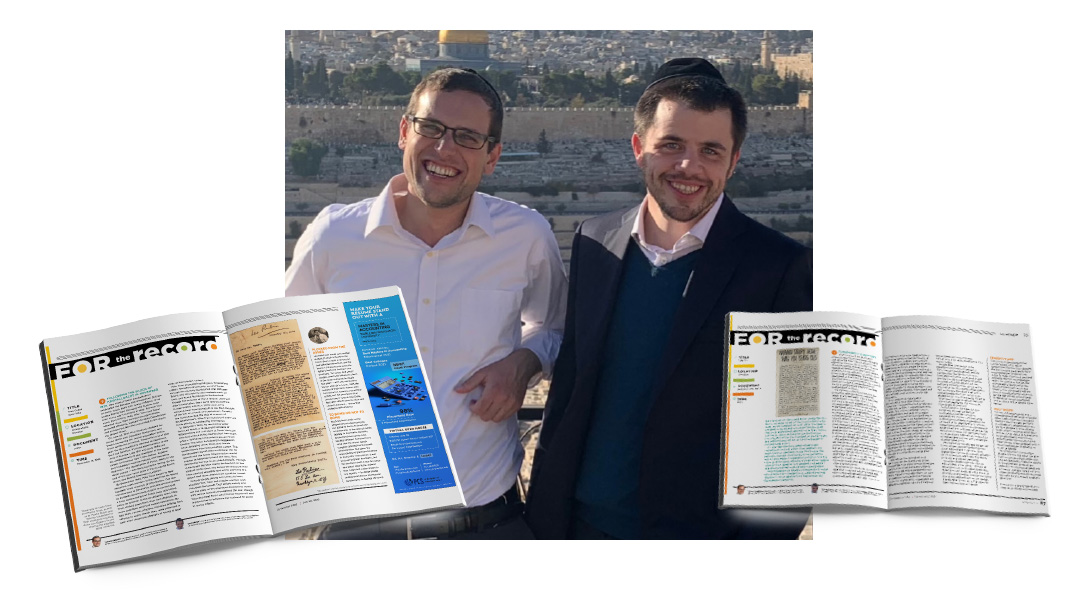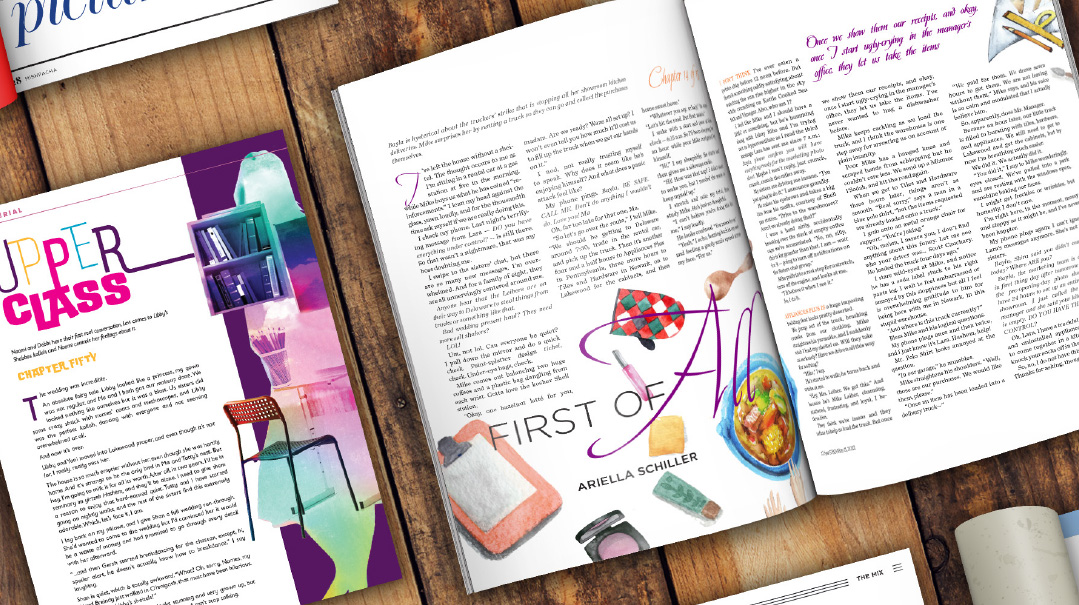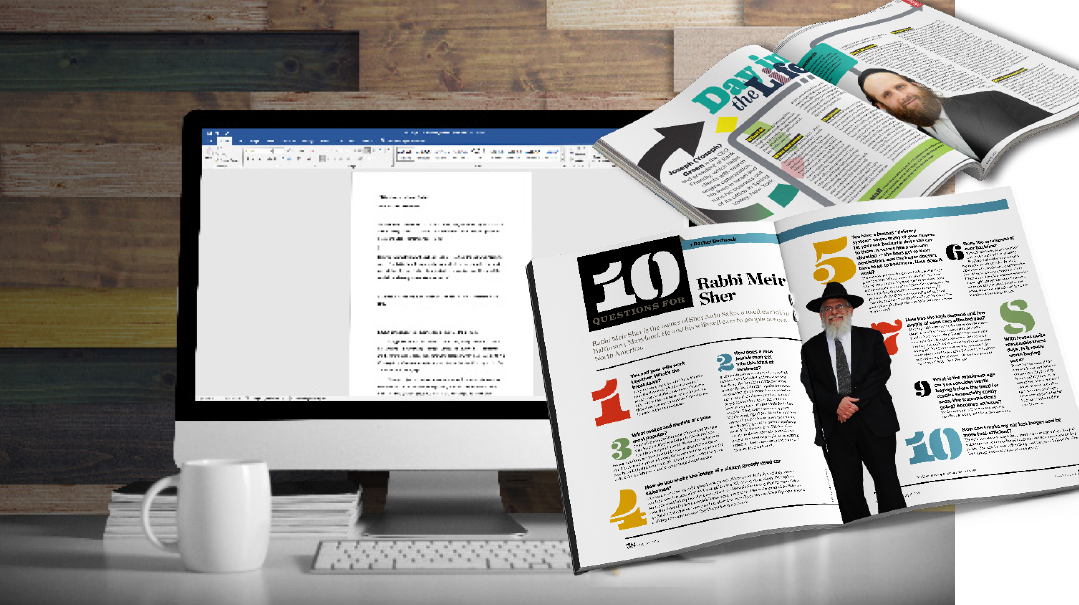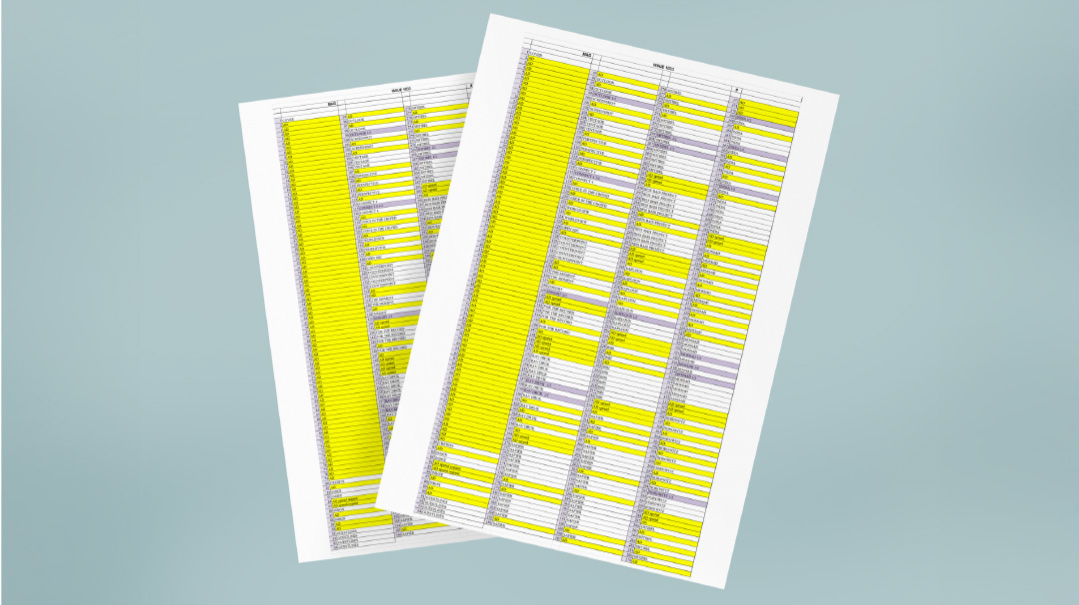20 questions… for Rachel Ginsberg
| July 9, 2024“I’m pretty old-school, but I still believe that a compelling article can pull people in, even if they’re more used to sound bites”
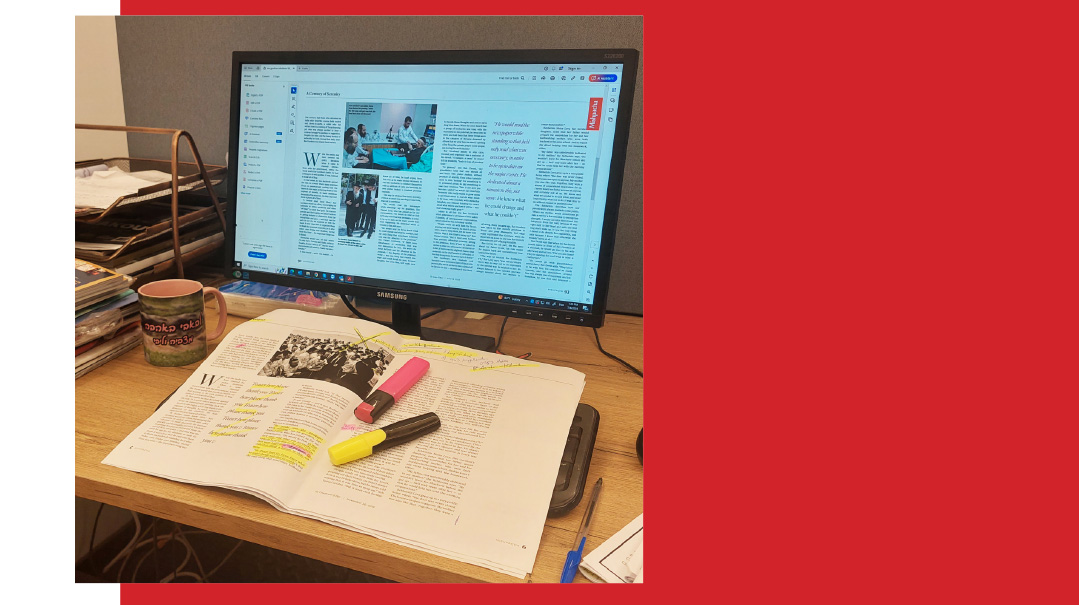
My ideal work environment
I once did an intake with a clinician who asked me what my dream environment was, and I told her, “Sitting in the sun with a cold drink.” True, that’s no way to get a magazine out, but I’m good as long as I have coffee and really nice, supportive people around (Mishpacha’s office has both!)
Deadlines make me
Work faster and more productively. I don’t do well without deadlines over my head
I’ve learned the most from writing about
People with complicated or painful challenges who’ve somehow pushed forward
The accomplishment I’m proudest of
Raising my family. I never really saw myself as a career person (although by the number of hours I spend in front of the computer, you’d never know it)
The best piece of advice I got
Don’t get derailed by your “animal soul,” the part that’s driven by comfort and instant gratification
1
How many years have you been at Mishpacha, and what does your job involve?
When Mishpacha’s founding editor, my good friend Faigel Safran, began the magazine in 2004 with a new and dynamic vision for Orthodox print media, I tagged along right behind her, pitching and writing occasional features. I officially came on board in 2007, when I filled an editing position for Shana Friedman while she was on maternity leave. When she came back, no one told me to pack up, so I’m still here. Looking back, I would say my job has evolved with the magazine — besides (occasional) writing, I do rewriting and editing, caption, headline and cover-text creation, and basically whatever it takes to bring a piece from its raw state to what you see on the page.
2
Have you ever considered switching jobs?
Nah, I’m one of those people who likes to stay where I’m planted. (I’m not such a good self-marketer, so I could never be one of those go-getter independent copywriters.)
3
What cultural shifts have affected the interests of your readers?
In the last decade, digital technology has created so many changes, and I often find myself at a loss, especially with younger readers: Do we even speak the same language? I’m pretty old-school, but I still believe that a compelling article can pull people in, even if they’re more used to sound bites.
4
How has the way articles are structured changed over the years?
It’s no secret that people in general have shorter attention spans today, and no one wants to read a lot of blah-blah before getting to the point of a story. So we need to make sure the piece grabs the reader right away, or else we’ve lost them before they’ve even started.
5
What is the article you’re most proud of?
That’s a little like asking who your favorite child is, but I can generally put my articles into several categories: I’ve done many informative pieces about the dedicated heroes among us trying to make the world a better place, then there are the “fun” pieces (for example, interviews with Ishay Ribo, Naftali Kempeh, Bardak, child stars who grew up, etc.), and the “left-field” pieces (for example, articles about the “Burka Ladies,” the messianic-wannabe Jerusalem Syndrome sufferers, the world-champion blind golfer who was a Shabak agent, etc.). And then there are the pieces that tug at my heart every time I think about them — one that comes to mind is an interview last summer with Devory Paley, just a few months after the loss of her two little boys in a terror ramming attack. She is a true heroine. I cry every time I reread it.
6
Did any of your articles kick off a communal conversation?
I’m always surprised when that happens, but two that are still getting traction even a few years later are the piece on parental alienation and the article about the new chassidus of the 21st century.
7
Who is the interviewee you’ll never forget?
Wow, there have been so many special people over the years, but one woman who comes to mind is 93-year-old Margalit Zinati, the last Jew in the village of Peki’in (where Rashbi’s cave and carob tree are located). She had a very difficult, sad life, she never married, but she’s a woman with huge merits, ad me’ah v’esrim.
8
Who is the interviewee who got away?
We recently wanted to do a piece on a well-known frum media celeb couple. I had this gut feeling they would refuse, and they did — for now, at least. But I’m not despairing — another celebrity media couple, Sivan and Yedidya Meir, also refused us for a few years, until (after numerous requests) Sivan one day sent me an email, “Rachel, motek, now it’s time….” Today she even has a column in the magazine.
9
What do you do when an interviewee decides to pull all their good quotes?
The knee-jerk reaction is usually hysteria (“Oh, no, the piece is ruined!”), which morphs into a desperate attempt at diplomacy and convincing (and that sometimes means reaching out to the spouse, because they’re usually the ones to pull all those great juicy quotes). But if that doesn’t work, we just move on. We know what happened, but readers don’t — they can’t tell that anything was supposed to be different.
10
What kind of mistakes make you cringe the most?
When me and the proofreaders find misused pronouns, or when someone submits a poorly-written draft to Production and I.
11
On average, how long do you spend editing a feature?
Every project is different. It can take two hours, or two days. I consider myself like a “shiputznik” (you know, those Israeli handymen who redo the tiles and paint and make an apartment shine), trying to raise the articles to the next level. Also, we often use translations from the Hebrew, and those generally need to be deconstructed and reconstructed for a different target readership with different expectations.
12
What is your favorite column to edit?
I love editing Endnote, my weekly foray into the music world. I’m actually a bit of a music trivia buff, and (forgive me, Riki Goldstein) I often add in extra tidbits about songs or albums, especially the oldies from when I was growing up.
13
Which article taught you the most?
I recently did a piece, together with Yonoson Rosenblum, about Hamas’s targeted destruction of Israel’s agriculture, which people assume was just collateral damage from their murderous rampage through the south. But it wasn’t — it was a planned, sinister agenda aimed at bringing Israel’s economy to its knees. I had no idea about this (and the reason you can’t buy a decent red pepper in Israel since Oct. 7), and I’m sure I wasn’t the only one.
14
Is there a topic Mishpacha covered that you never would have expected to see?
When they asked me to do a piece about the challenges of newlyweds during Covid (“Locked Inside Paradise”), I was pretty surprised — until I discovered that it was a very complicated scenario that rabbanim and shalom bayis mentors were dealing with constantly. I think it was a very brave piece — kol hakavod to the editorial board who pushed it through.
P.S. In retrospect, it turned out that it was more about challenges than crises, and that all those feared divorces never actually happened. Although there were huge stressors, for most healthy couples who didn’t have preexisting issues, it wasn’t a deal-breaker. It was like one madrich chassanim told me at the time, “They wanted to figure out how to make it work better — practical tips and advice on how to get through, not how to get out.”
15
How do you choose good cover text?
Writing cover text, like writing intros and captions, probably has lots of rules, but to be honest, I generally go by how I hear the rhythm in my head. It’s almost like writing a song.
16
What’s the most effective way to get an interviewee to share moving, dramatic, or personal material?
I believe a good interviewer has to be a real empathizer, making the interviewee feel like you’re on the same team. I rarely take notes, and I never schlep a laptop (that’s a good way to get sound bites, not an honest conversation). I use a discreet recording device in order to free myself up for a real conversation without distractions, and by keeping the dialogue open and not second-guessing my interviewee’s answers, there will always be surprises and an enhanced level of honesty and openness. I try to become the interviewee’s “sheitelmacher” (you know how everyone wants to tell secrets to their sheitelmacher?) — that means validating them and making them feel that you’re on their side (and if you believe in them, you should be).
17
How do writers react when they see the edited versions of their pieces?
I’m always nervous, and sometimes if they’re upset, we hash it out and try to find a happy medium (since I’m the last one to see the text before it closes for print, I could really pull rank, although I prefer that we’re all on the same page in the end). But the writers are usually happy, and they often can’t even tell that I might have done an overhaul. I once did a complete rewrite, and when the writer got it back, she told me, “Thanks so much for writing such a good title and intro….” It’s all part of the job. It used to make me feel annoyed and resentful. Today, I just look at it as being part of the team.
18
Who edits your pieces, and how do you react?
Only our “captain,” Shana Friedman (I throw a tantrum if anyone else goes near them). She’s an amazing editor, and I’ve learned most of my skills from her over the years. I’m always more than happy when she edits and improves my pieces.
19
What’s the first thing you read when you get the printed magazine?
I love the serials — and I generally don’t see them until the magazine comes out (I’m not such a big intellectual when it comes to reading — serials are totally my speed). If the stories are so compelling that you tear off the plastic as soon as you’re holding the mag in your hand, that’s the yardstick of a good product.
20
What’s your biggest fact-checking secret or tip?
Well, there’s always Wikipedia. But I’ve discovered a few other sites that can help solve a lot of family lineage mysteries — geni.com and kevarim.com are two of them. It’s amazing how you can piece together missing family information from these sites, and the comments on kevarim.com can open up an unknown world of personal history (is it weird to be looking at a site about graves?).
(Originally featured in Mishpacha, Issue 1019)
Oops! We could not locate your form.

